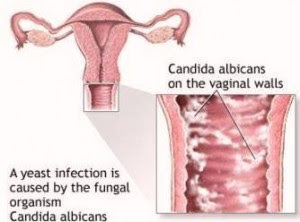Yeast infection, also known as candidiasis, are most commonly found in warm and moist parts of the body. Yeast is actually a fungus. One of the 20 species of Candida (or yeast), called Candida albicans, live all over our body. But sometimes, under certain conditions they cause infections.
These infections can range from a not- so- serious infection, to a life threatening disease. These infections are most common in the mouth and moist areas of skin. Women get yeast infections quite often in the vagina.
That type of infection is called vulvovaginal candidiasis. There are many reasons why a yeast infection can occur. Pregnancy, injury, antibiotics, certain clothing fabric, condoms, illness, stress, certain chemicals, tampons, sanitary pads, hormonal fluctuations, increased pH level, or medications can all be causes for a yeast infection. It is said that about 20-50 % of females have yeast in their vaginal area.
Yeast infections occur either when a new type of yeast is brought into the region or when the already present yeast overgrows and become numerous. They can be treated by antibiotics just like you would treat any other infection. Another name that you might hear a yeast infection be called by is “Thrush or Moniliasis”.
Many people who have a weak immune system are at a greater risk for a yeast infection, since they are more susceptible to infections than others. This infection can be life threatening to a person with AIDS or Cancer, who generally have very weak immune system.
Adults, commonly, more often get yeast infections when they age. Many women know they have a yeast infection when they feel a burning sensation, soreness, and itching sensation, or when they see an odorless, white and thick discharge in the vagina. There are a lot of reasons why a person can develop a yeast infection including catheters, IV’s, needles, and fungus. It is important to see a doctor to get antibiotics if you have a yeast infection.
If the medication fails to work it is crucial to go back to consult your doctor. Yeast infections are not fun to deal with, but unfortunately almost everyone gets at least one at some point in their lifetime.
Many women feel pain when having sexual intercourse or have a burning sensation when they urinate. Those are both symptoms and signs of a yeast infection. Making sure to take all of your antibiotics for a yeast infection is important.
My dear post readers I have an idea on what yeast infection can actually do as I am a medical practitioner my self and the main purpose of this post is to help you take action in curing your infection by clicking here for a free e book on how to cure yeast infection the natural way.


No comments:
Post a Comment